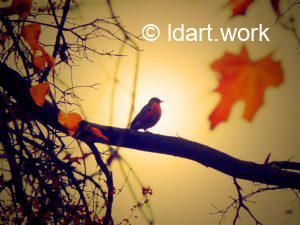
The limits of knowledge
A dialogue between Socrates the stick and Gottfried the bird. Socrates knows he does not know anything and this leads him to ask many questions. He then carefully examines the responses. Gottfried thinks that each being is independent but part of a logical and harmonious whole, accessible through singing.
Socrates: Gottfried, do you know if Baruch is gone? I didn’t see him this morning.
Gottfried: yes, he went to Oklahoma last night.
Socrates: to Oklahoma? But it’s dangerous to go there, there are a lot of hunters, aren’t there?
Gottfried: oh, he’s smart, he lives in a wild animal reserve.
Socrates: yes but the journey, the distance…
Gottfried: he flies at night and takes his time. He knows the way well, don’t worry about him.
Socrates: Gottfried, I realize once again that appearances are deceptive because the Baruch around the ponds is not the Baruch that travels. He has other resources and other ways of doing things that it’s not easy to imagine when you see him here. We must therefore never believe that our knowledge of the world or of others is total and here is another example. In any case, I’m going to miss him. Do you have his address?
Gottfried: I have it somewhere in case something happens.
Socrates: something?
Gottfried: if there are no more fish, for example. You know the ponds are shallow and filled with dead leaves. If it freezes too much, there is not enough oxygen in the open water and the fish will die. This is a negative consequence born of the harmony of the world: when one element is too stressed, it affects the others.
Socrates: your mastery of natural phenomena and their connections impresses me.
Gottfried: dear Socrates, how do you think we’d survive if we didn’t know anything about the world around us?
Socrates: I thought it was instinct that guided you.
Gottfried: you are right, that instinct drives us to seek pleasure therefore we need to know how changing environmental conditions can affect us and threaten or enhance that pleasure.
Socrates: are all animals like that?
Gottfried: yes, of course, understanding ecosystems is not reserved for plants like you.
Socrates: I am not a plant, Gottfried, I am a tree, part of a tree to be exact.
Gottfried: ah, that’s right, trees are quite proud of their status, I had forgotten that!
Socrates: you also forgot that they shelter you and serve as your perch! But tell me, how do you get mail to Baruch?
Gottfried: For long distances, geese or ducks take care of it. For short distances, you can count on owls.
Socrates: you are well organized!
Gottfried: you don’t know everything, dear Socrates, because apart from the knowledge which is useful to you, there are thousands of other things that exists for those who are different from you. The world you are familiar with is not necessarily the world as it is. Do I really have to remind you of this when you are always trying to go beyond appearances and ready-made opinions?
Socrates: you are right, Gottfried, I still sometimes allow myself to be surprised by my preconceptions. That’s why it is good to always assess the validity of our opinions. With the help from others, it is often easier and you open new doors for me. I should come and talk to you more often.
Gottfried: your questions make me think too so you see, the pleasure is mutual.
Analysis
Is the world we know the only one that exists?
For Gottfried, our world is the one that is useful to us but there are others in relation to different needs so that we can only have one limited vision of what is, although everything is linked as the experience of difficulties makes us realize sometimes.
For Socrates, it is necessary to always question our opinions because meetings with others prove that these opinions can be false or fragmentary.
Possible discussions
Do we know only what we need to know?
Does what I do not perceive exist?
Finally
Want to think a little more? See, for example, Principles of Human Knowledge where Berkeley explains that the world only exists in the mind.
Want to contribute to these dialogues? Write your comments and questions below.
Want to know more about the tastes of Socrates and Gottfried? Their favorite books are in the domain library.

